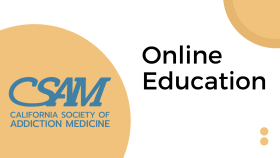
Treating Pain and Addiction: What's New? What Can We Do?
Insert Workshop Description
PRICE: $275 (Members) | $385 (Non-Members)
Target Audience
This activity is designed for health care professionals that want to know more about the latest in treating patients with opioid substance use disorder, the state of current systems of care, and the legal implications of staying in compliance.
Learning Objectives
After participating in this workshop, the registrants should be able to:
- Define the relationship between pain and addiction and explain how chronic opioid therapy can lead to addiction.
- Review the best practices in pain management for individuals with a history of a substance use disorder.
- Assess the role of the healthcare system and policy makers in addressing pain management and addiction, including prescribing guidelines, education, and intervention strategies.
- Develop a treatment plan for patients with chronic pain and addiction, including the integration of pharmacological, behavioral, and alternative therapies.
- Demonstrate effective communication and counseling skills in working with patients with pain and addiction, including motivational interviewing and empathic listening.
Julio Meza, MD
Addiction Medicine Fellowship Director, UCLA
Dr. Julio Meza is an Addiction and Family Medicine Physician at the David Geffen School of Medicine at UCLA and a Psychiatry in Primary Care Certified Physician at UC Irvine. Dr. Meza was born and raised in El Salvador. He graduated Cum Laude from Universidad Evangelica de El Salvador. After graduating from medical school, he was accepted into a surgical residency and completed an internship at the Hospital Military Central in El Salvador. He left El Salvador to pursue his dream of becoming a U.S. licensed family physician. While in Los Angeles, Dr. Meza worked as a medical assistant instructor and program director, training students to work in the areas of San Fernando, North Hollywood and Los Angeles then joined UCLA and completed his residency in Family Medicine and also Fellowship in Addiction Medicine. Dr. Meza enjoys working with patients from all backgrounds and provides non judgmental compassionate care.
Huiqiong (Joan) Deng, MD, PhD
Clinical Assistant Professor, Stanford University
Dr. Huiqiong Deng is a clinical assistant professor of psychiatry. In addition to a medical degree, she earned a PhD, with a major in rehabilitation science and a minor in neuroscience. Specializing in the treatment of alcohol/substance addiction, interventional and cultural psychiatry, her goal is to help each patient along the journey to achieve optimal health and quality of life. As the co-author of more than a dozen scholarly articles, Dr. Deng’s work has appeared in Psychiatry Research, Journal of Studies on Alcohol and Drugs, American Journal on Addictions, and other peer reviewed journals. Dr. Deng has won numerous honors and awards such as the NIDA Young Investigator Travel Award, the ASAM Ruth Fox Scholarship, and College on the Problems of Drug Dependence Travel Award for Early Career Investigators, and Stanford Psychiatry Department Chairman's Clinical Innovation and Service Award.
Soraya Azari, MD
Associate Professor, UC San Francisco
Soraya Azari is an Associate Professor of Medicine at the UCSF School of Medicine. She completed her residency at UCSF in the San Francisco General Primary Care program and Chief Residency year at San Francisco General Hospital. She is the Physician Lead for QI and Safety for Controlled Substances in the Richard Fine People's Clinic, the Associate Program Director for the Addiction Medicine Fellowship at UCSF, and the director of a Hepatitis C treatment program in the ZSFG opiate treatment outpatient program. Research and teaching interests include improving the quality of care for patients with substance use disorders and chronic pain, and facilitating the transition between the inpatient and outpatient settings.
Yulsi Fernandez Montero, MD, MPH
Assistant Clinical Professor, UCLA
Dr. Yulsi L. Fernandez Montero is board certified in Family Medicine and Addiction Medicine, and has a passion for education, a deep commitment to social justice, health equality, leadership, and URM mentoring and advancement in medicine. She was born and raised in Mexico and moved to the United States as a teenager where she has witnessed and benefitted from the beauty, strength and resiliency of diverse communities including immigrant and underserved communities. Dr. Fernandez Montero graduated from David Geffen School of Medicine at UCLA and completed her post-graduate training at UCLA Santa Monica Medical Center. She is now part of the Family Medicine Faculty at the David Geffen School of Medicine at UCLA, where she also provides patient care.
PHYSICIANS: The California Society of Addiction Medicine (CSAM) is accredited by the California Medical Association to provide continuing medical education for physicians. CSAM takes responsibility for the content, quality and scientific integrity of this CME activity.
CSAM designates this educational activity/enduring material for a maximum of 3 AMA/PRA Category 1 Credits™. (Physicians should only claim credit commensurate with the extent of their participation in the activity.) This credit may also be applied to the CMA Certification in Continuing Medical Education.
NON-PHYSICIANS: The California Society of Addiction Medicine (CSAM) provides a certificate of attendance for this online course based upon the number of hours you participated, up to maximum of 3.
DISCLOSURE OF FINANCIAL RELATIONSHIPS
In accordance with the ACCME Standards for Integrity and Independence, CSAM adheres to guidelines and processes to identify and mitigate relevant financial relationships for all individuals in a position to control the content of this activity. Unless otherwise noted, faculty did not have any relevant financial relationships with ineligible companies, as defined by ACCME, within the past 24 months. All relevant financial relationships have been mitigated.
Available Credit
- 3.00 AMA Category 1
- 3.00 Attendance

 Facebook
Facebook X
X LinkedIn
LinkedIn Forward
Forward